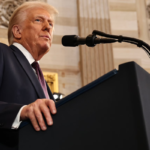Israeli Prime Minister Benjamin Netanyahu was scheduled to meet with U.S. President Donald Trump at the White House on Monday. At the same time, Israeli officials were engaged in indirect talks with Hamas, aiming to reach a ceasefire and hostage-release agreement mediated by the United States regarding the situation in Gaza.
Netanyahu’s visit followed Trump’s statement expressing optimism that an agreement could be reached within the week. Before traveling to Washington, Netanyahu indicated that his discussions with Trump could support ongoing negotiations between Israel and Hamas in Qatar.
This meeting marked the third time Trump had hosted Netanyahu since January. It came shortly after U.S. airstrikes on Iranian nuclear facilities, which supported Israeli military actions, and after a ceasefire was brokered in a recent conflict between Israel and Iran.
Trump and his administration appeared to be attempting to build on the reduced influence of Iran, a supporter of Hamas, to encourage progress toward resolving the Gaza conflict, which has lasted for 21 months. The president also planned to discuss the possibility of a longer-term agreement with Iran.
Netanyahu arrived in Washington overnight and was set to meet with Trump’s Middle East envoy Steve Witkoff and Secretary of State Marco Rubio ahead of his talks with the president. The leaders planned a private dinner instead of the typical formal meeting in the Oval Office.
Israeli officials also hoped that developments related to Iran would facilitate normalisation of relations with other neighbouring countries such as Lebanon, Syria, and Saudi Arabia, which were expected to be part of the discussions with Trump.
Ahead of the visit, Netanyahu expressed appreciation for the U.S. strikes on Iranian nuclear sites and noted that Israeli negotiators were pursuing a deal in Doha, Qatar.
Qatar Negotiations
Witkoff, who was involved in developing a 60-day ceasefire proposal central to the Qatar negotiations, was expected to travel to Doha to continue talks. Palestinian sources indicated that Israel’s restrictions on humanitarian aid entering Gaza remained a significant barrier to progress.
On the second day of negotiations, one round was held, with further talks expected later. Israeli officials confirmed that humanitarian aid was discussed but provided no additional details.
The U.S.-supported proposal includes a phased release of hostages, Israeli troop withdrawals from parts of Gaza, and discussions aimed at ending the conflict.
Hamas has called for a full end to hostilities before releasing remaining hostages, while Israel insists on the release of all hostages and the dismantling of Hamas before ceasing military operations.
Trump previously stated he would emphasise the need for a prompt Gaza agreement during his talks with Netanyahu, who also expressed a desire to end the conflict.
Some members of Netanyahu’s coalition oppose ending the fighting. However, given public fatigue over the conflict, his government is expected to support a ceasefire if the terms are acceptable.
A ceasefire earlier this year collapsed in March, and efforts to restore it have not yet succeeded. Meanwhile, Israel has increased its military actions in Gaza and restricted food distribution.
Mohammed Al Sawalheh, a Palestinian displaced from northern Gaza, stated a desire for a truce to stop ongoing casualties.
The conflict began in October 2023 when Hamas attacked southern Israel, resulting in approximately 1,200 deaths and the capture of 251 hostages. About 50 hostages remain in Gaza, with an estimated 20 still alive.
Israeli military operations in Gaza have resulted in over 57,000 Palestinian deaths, according to Gaza’s health authorities. Significant displacement and food insecurity affect much of the population, with nearly half a million people at risk of famine in the coming months, according to the United Nations.
Political Context
Trump has expressed strong support for Netanyahu, recently criticizing prosecutors involved in the Israeli leader’s corruption trial, which Netanyahu denies. Trump suggested that the judicial process could interfere with Netanyahu’s ability to conduct negotiations with Hamas and Iran.
Trump said he planned to discuss Iran’s nuclear program with Netanyahu and described the U.S. strikes on Iranian nuclear sites as successful. He stated that Iran’s nuclear efforts had been set back, although acknowledged the possibility of renewed attempts. Iran has denied seeking nuclear weapons.



